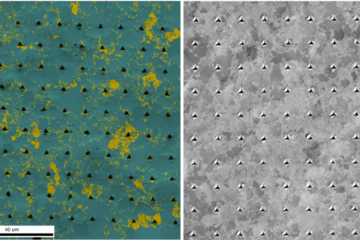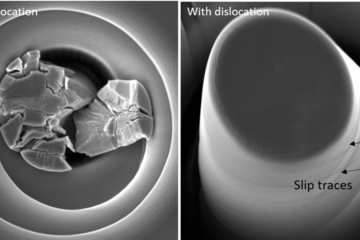All genres
101.
Talk
Arthropod cuticle: A biological multifunctional composite used as template for multiscale modelling. 11th National Congress on Theoretical and Applied Mechanics NCTAM 2009, Borovets, Bulgaria (2009)
102.
Talk
Hierarchical modeling of the mechanical properties of lobster cuticle from the nanoscale up to the macroscale. ICSMA 15: International Conference on the Strength of Materials, Dresden, Germany (2009)
103.
Talk
Atomistic calculations of interfaces: Bridging the relevant scales. Institute’s Colloquium, Institut für Gesteinshüttenkunde, Aachen, Germany (2009)
104.
Talk
A multiscale study of the Hydrogen enhanced local plasticity (HELP) mechanism. Asia Steel Conference 2009, Busan, South Korea (2009)
105.
Talk
A multiscale study of the Hydrogen-enhanced local plasticity mechanism (HELP). Fruehjahrstagung der Deutschen Physikalischen Gesellschaft 2009, Dresden, Germany (2009)
106.
Talk
A multiscale study of hydrogen embrittlement in metals: Revisitting the Hydrogen-enhanced local plasticity mechanism. APS March Meeting, Pittsburgh, PA, USA (2009)
107.
Talk
Large anisotropic adatom kinetics on nonpolar GaN surfaces: Consequences on nanowire growth. PDI Topical Workshop on MBE-grown Nitride Nanowires, Berlin, Germany (2009)
108.
Talk
Multiscale Modeling of the Mechanics of Metallic and Biological Polycrystals using Ab Initio and Continuum Methods. MMCM 2009 Colloquium on Multiscale Methods in Computational Mechanics, Rolduc, The Netherlands (2009)
109.
Talk
Ab-initio based calculations: From semiconductors, to metals, and bio-inspired materials. Colloquium, Physics Department, University of Crete, Heraklion, Greece (2009)
110.
Talk
Extremal stiffness of crustacean cuticle through hierarchical optimization: Experiments and modeling from ab initio to macroscale. PLASTICITY 2009, St. Thomas, Virgin Islands, USA (2009)
111.
Talk
Atomic Structure and Elastic Anisotropy of Crystalline α-chitin: An Ab-initio Based Conformational Analysis. MRS Fall Conference 2008, Boston, MA, USA (2008)
112.
Talk
Ab-initio based growth simulations of GaN based nanowires. MRS fall meeting, Boston, MA, USA (2008)
113.
Talk
Hierarchical Modeling of the Elastic Properties of Lobster Cuticle via Ab Initio Calculations and Mean-field Homogenization. MRS Fall Conference 2008, Boston, MA, USA (2008)
114.
Talk
Ground-state structure and elastic anisotropy of crystalline alpha-chitin: An ab-initio based conformational analysis. Materials Research Society meeting (MRS), Boston, MA, USA (2008)
115.
Talk
Multiscale Modelling of the Elastic Properties of Biological Polymer-Based Nanocomposites with Hierarchical Microstructure: The Lobster Cuticle. 3rd International Conference on Polymer Behaviour, Marrakech, Morocco (2008)
116.
Talk
Ab initio study of Thermodynamics and adatom kinetics on non-polar GaN surfaces: Consequences on the growth morphology and the formation of nanowires. International Workshop on Nitride Semiconductors, Montreux, Switzerland (2008)
117.
Talk
Growth simulations of non-polar GaN surfaces: Thermodynamics, kinetics and dopant incorporations. Bremen DFG Forschergruppe: Workshop in Riezlern, Reizlern, Austria (2008)
118.
Talk
Grain Boundaries: Statics and Mobility. Computational Materials Science Workshop, Ebernburg Castle, Germany (2008)
119.
Talk
Thermodynamics and adatom kinetic on non-polar GaN surfaces: origin of a strong growth anisotropy. E-MRS Spring meeting, Strasbourg, France (2008)
120.
Talk
Ab-initio based calculation of GaN surfaces, interfaces, and extended defects. Colloquium Paul-Drude-Institut Berlin, Berlin, Germany (2008)











